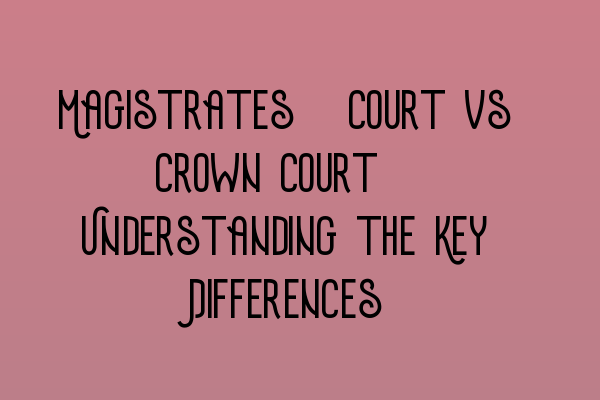Magistrates’ Court vs Crown Court: Understanding the Key Differences
Welcome to the SQE Criminal Law & Practice Law UK blog! In today’s article, we will delve into the key differences between Magistrates’ Court and Crown Court proceedings. Whether you are studying for the SQE 1 or SQE 2 exams or simply interested in criminal law, this post will provide you with a comprehensive understanding of these two important components of the criminal justice system.
1. Jurisdiction
Magistrates’ Courts hold jurisdiction over less serious offenses, known as summary offenses, while Crown Courts handle more serious cases, known as indictable offenses. Understanding the distinction in jurisdiction is crucial for legal professionals, as it determines where cases are initially tried and whether a defendant has the right to elect trial by jury.
In the Magistrates’ Court, the majority of criminal cases start and end their journey. These courts deal with offenses such as petty theft, public order offenses, and minor driving offenses. The emphasis here is on providing quicker and more streamlined justice.
On the other hand, Crown Courts handle more complex and serious cases, including homicide, drug trafficking, and major fraud offenses. These cases are typically transferred from the Magistrates’ Court to the Crown Court, where they receive more thorough scrutiny due to the gravity and complexity of the charges.
For more information on the SQE 1 practice exam questions, check out our SQE 1 Practice Exam Questions article.
2. Trial Procedure
The trial procedures in the Magistrates’ Court and Crown Court also differ significantly. In the Magistrates’ Court, trials are conducted before a bench of non-legally qualified magistrates or a district judge. These trials are relatively informal, and the focus is on establishing guilt or innocence based on the facts presented.
In contrast, Crown Court trials are presided over by a judge with a jury consisting of 12 randomly selected members of the public. Here, the trial proceedings are more formal and structured, with the jury playing a crucial role in determining guilt or innocence based on the evidence presented by both the prosecution and defense.
If you’re interested in honing your skills for the SQE 1 exams, make sure to check out our SQE 1 Practice Mocks FLK1 FLK2 for comprehensive preparation.
3. Sentencing Powers
Another significant difference between Magistrates’ Court and Crown Court is the sentencing powers they possess. Magistrates’ Courts have limited sentencing powers, typically restricted to a maximum custodial sentence of six months for a single offense or 12 months in total for multiple offenses. They can also impose fines, community orders, and driving disqualifications.
Crown Courts, on the other hand, have far greater authority when it comes to sentencing. They can administer longer custodial sentences, including life imprisonment for the most severe offenses. Additionally, Crown Courts can combine different types of sentences, such as imprisonment with fines or community orders, to ensure a comprehensive and appropriate penalty.
To learn more about the SQE 2 exam preparation courses we offer, please visit our SQE 2 Preparation Courses page.
4. Appeals
Lastly, the process of appealing a decision also varies between the Magistrates’ Court and Crown Court. In the Magistrates’ Court, individuals can appeal against both conviction and sentencing decisions to the Crown Court. This allows for a review of the case by a higher court with more extensive legal expertise.
In the Crown Court, appeals can be made to the Court of Appeal Criminal Division, which deals exclusively with appeal cases. The Court of Appeal has the power to review both the conviction and sentence handed down by the Crown Court, ensuring fair treatment and adequate access to justice.
If you’re looking for SQE 1 exam preparation courses to boost your chances of success, visit our SQE 1 Preparation Courses page.
Stay up-to-date with the latest SRA SQE exam dates by referring to our SRA SQE Exam Dates article.
Thank you for reading our blog post on the key differences between Magistrates’ Court and Crown Court. We hope this article has provided you with valuable insights into the criminal justice system. If you have any further questions or require legal assistance, feel free to contact us at SQE Criminal Law & Practice Law UK.
